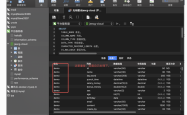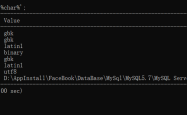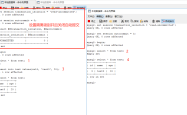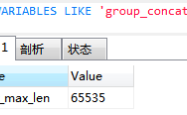mysql中json_extract的使用方法实例详解
一、前言
mysql5.7版本开始支持JSON类型字段,本文详细介绍json_extract函数如何获取mysql中的JSON类型数据
json_extract可以完全简写为 ->
json_unquote(json_extract())可以完全简写为 ->>
下面介绍中大部分会利用简写
二、创建示例表
?| 1 2 3 4 5 | CREATE TABLE `test_json` ( `id` int (11) NOT NULL AUTO_INCREMENT, `content` json DEFAULT NULL , PRIMARY KEY (`id`) ) ENGINE=InnoDB AUTO_INCREMENT=3 DEFAULT CHARSET=utf8mb4; |
| 1 2 3 | # 插入两条测试用的记录 INSERT INTO `test_json` (`content`) VALUES ( '{\"name\":\"tom\",\"age\":18,\"score\":[100,90,87],\"address\":{\"province\":\"湖南\",\"city\":\"长沙\"}}' ); INSERT INTO `test_json` (`content`) VALUES ( '[1, "apple", "red", {"age": 18, "name": "tom"}]' ); |
| id | content |
|---|---|
| 1 | {“age”: 18, “name”: “tom”, “score”: [100, 90, 87], “address”: {“city”: “长沙”, “province”: “湖南”}} |
| 2 | [1, “apple”, “red”, {“age”: 18, “name”: “tom”}] |
三、基本语法
- 获取JSON对象中某个key对应的value值
- json_extract函数中,第一个参数content表示json数据,第二个参数为json路径,其中$表示该json数据本身,$.name就表示获取json中key为name的value值
- 可以利用 -> 表达式来代替json_extract
- 若获取的val本身为字符串,那么获取的val会被引号包起来,比如"tom",这种数据被解析到程序对象中时,可能会被转义为\“tom\”。为了解决这个问题了,可以在外面再包上一层json_unquote函数,或者使用 ->> 代替->
?content:
{“age”: 18, “name”: “tom”, “score”: [100, 90, 87], “address”: {“city”: “长沙”, “province”: “湖南”}}
| 1 2 3 4 5 6 7 8 9 10 11 12 13 14 15 16 17 18 19 20 21 22 23 24 25 26 27 28 29 30 31 | # 得到 "tom" select json_extract(content, '$.name' ) from test_json where id = 1; # 简写方式:字段名->表达式等价于json_extract(字段名,表达式) select content-> '$.name' from test_json where id = 1; # 结果: + --------------------------------+ | json_extract(content, '$.name' ) | + --------------------------------+ | "tom" | + --------------------------------+ + -------------------+ | content-> '$.name' | + -------------------+ | "tom" | + -------------------+ # 解除双引号,得到tom select json_unquote(json_extract(content, '$.name' )) from test_json where id = 1; # 简写方式:字段名->>表达式等价于json_unquote(json_extract(字段名,表达式)) select content->> '$.name' from test_json where id = 1; # 结果: + ----------------------------------------------+ | json_unquote(json_extract(content, '$.name' )) | + ----------------------------------------------+ | tom | + ----------------------------------------------+ + --------------------+ | content->> '$.name' | + --------------------+ | tom | + --------------------+ |
- 获取JSON数组中某个元素
- json_extract函数中,第一个参数content表示json数据,第二个参数为json路径,其中$表示该json数据本身,$[i]表示获取该json数组索引为i的元素(索引从0开始)
- 与获取key-val一样,若获取的元素为字符串,默认的方式也会得到双引号包起来的字符,导致程序转义,方法也是利用json_unquote函数,或者使用 ->> 代替->
?content:
[1, “apple”, “red”, {“age”: 18, “name”: “tom”}]
| 1 2 3 4 5 6 7 8 9 10 11 12 13 14 15 16 17 18 19 20 21 22 23 24 25 26 27 28 29 30 31 | # 得到 "apple" select json_extract(content, '$[1]' ) from test_json where id = 2; # 简写,效果同上 select content-> '$[1]' from test_json where id = 2; # 结果: + ------------------------------+ | json_extract(content, '$[1]' ) | + ------------------------------+ | "apple" | + ------------------------------+ + -----------------+ | content-> '$[1]' | + -----------------+ | "apple" | + -----------------+ # 解除双引号,得到apple select json_unquote(json_extract(content, '$[1]' )) from test_json where id = 2; # 简写,效果同上 select content->> '$[1]' from test_json where id = 2; # 结果: + --------------------------------------------+ | json_unquote(json_extract(content, '$[1]' )) | + --------------------------------------------+ | apple | + --------------------------------------------+ + ------------------+ | content->> '$[1]' | + ------------------+ | apple | + ------------------+ |
- 获取JSON中的嵌套数据
结合前面介绍的两种获取方式,可以获取json数据中的嵌套数据
?content: id=1
{“age”: 18, “name”: “tom”, “score”: [100, 90, 87], “address”: {“city”: “长沙”, “province”: “湖南”}}
content: id=2
[1, “apple”, “red”, {“age”: 18, “name”: “tom”}]
| 1 2 3 4 5 6 7 8 9 10 11 12 13 14 15 16 17 | # 得到:87 select content-> '$.score[2]' from test_json where id = 1; # 结果: + -----------------------+ | content-> '$.score[2]' | + -----------------------+ | 87 | + -----------------------+ # 得到:18 select content-> '$[3].age' from test_json where id = 2; # 结果: + ---------------------+ | content-> '$[3].age' | + ---------------------+ | 18 | + ---------------------+ |
四、渐入佳境
- 获取JSON多个路径的数据
将会把多个路径的数据组合成数组返回
?content: id=1
{“age”: 18, “name”: “tom”, “score”: [100, 90, 87], “address”: {“city”: “长沙”, “province”: “湖南”}}
| 1 2 3 4 5 6 7 8 9 10 11 12 13 14 15 | select json_extract(content, '$.age' , '$.score' ) from test_json where id = 1; # 结果: + -----------------------------------------+ | json_extract(content, '$.age' , '$.score' ) | + -----------------------------------------+ | [18, [100, 90, 87]] | + -----------------------------------------+ select json_extract(content, '$.name' , '$.address.province' , '$.address.city' ) from test_json where id = 1; # 结果: + ----------------------------------------------------------------------+ | json_extract(content, '$.name' , '$.address.province' , '$.address.city' ) | + ----------------------------------------------------------------------+ | [ "tom" , "湖南" , "长沙" ] | + ----------------------------------------------------------------------+ |
- 路径表达式*的使用
将会把多个路径的数据组合成数组返回
?| 1 2 | # 先插入一条用于测试的数据 INSERT INTO `test_json` (`id`,`content`) VALUES (3, '{"name":"tom","address":{"name":"中央公园","city":"长沙"},"class":{"id":3,"name":"一年三班"},"friend":[{"age":20,"name":"marry"},{"age":21,"name":"Bob"}]}' ) |
?content: id=3
{“name”: “tom”, “class”: {“id”: 3, “name”: “一年三班”}, “friend”: [{“age”: 20, “name”: “marry”}, {“age”: 21, “name”: “Bob”}], “address”: {“city”: “长沙”, “name”: “中央公园”}}
| 1 2 3 4 5 6 7 8 9 10 11 12 13 14 15 16 17 18 19 20 21 22 23 24 | # 获取所有二级嵌套中 key = name 的值 # 由于friend的二级嵌套是一个数组,所以. name 获取不到其中的所有 name 值 select content-> '$.*.name' from test_json where id = 3; + ----------------------------------+ | content-> '$.*.name' | + ----------------------------------+ | [ "一年三班" , "中央公园" ] | + ----------------------------------+``` # 获取所有 key 为 name 值的数据,包括任何嵌套内的 name select content-> '$**.name' from test_json where id = 3; + ---------------------------------------------------------+ | content-> '$**.name' | + ---------------------------------------------------------+ | [ "tom" , "一年三班" , "marry" , "Bob" , "中央公园" ] | + ---------------------------------------------------------+ # 获取数组中所有的 name 值 select content-> '$.friend[*].name' from test_json where id = 3; + -----------------------------+ | content-> '$.friend[*].name' | + -----------------------------+ | [ "marry" , "Bob" ] | + -----------------------------+ |
- 返回NULL值
content: id=1
{“age”: 18, “name”: “tom”, “score”: [100, 90, 87], “address”: {“city”: “长沙”, “province”: “湖南”}}
寻找的JSON路径都不存在
?| 1 2 3 4 5 6 7 8 | # age路径不存在,返回 NULL # 若有多个路径,只要有一个路径存在则不会返回 NULL select json_extract(content, '$.price' ) from test_json where id = 1; + ---------------------------------+ | json_extract(content, '$.price' ) | + ---------------------------------+ | NULL | + ---------------------------------+ |
路径中有NULL
?| 1 2 3 4 5 6 7 | # 存在任意路径为 NULL 则返回 NULL select json_extract(content, '$.age' , NULL ) from test_json where id = 1; + ------------------------------------+ | json_extract(content, '$.age' , NULL ) | + ------------------------------------+ | NULL | + ------------------------------------+ |
- 返回错误
若第一个参数不是JSON类型的数据,则返回错误
?| 1 | select json_extract( '{1,2]' ,$[0]) |
若路径表达式不规范,则返回错误
?| 1 2 3 | select content-> '$age' from test_json where id = 1; # 结果: ERROR 3143 (42000): Invalid JSON path expression. The error is around character position 1. |
五、使用场景
JSON_EXTRACT函数通常用于要获取JSON中某个特定的数据或者要根据它作为判断条件时使用
六、参考文档
- mysql5.7官方文档
- https://www.sjkjc.com/mysql-ref/json_extract
总结
到此这篇关于mysql中json_extract使用方法的文章就介绍到这了,更多相关mysql中json_extract使用内容请搜索服务器之家以前的文章或继续浏览下面的相关文章希望大家以后多多支持服务器之家!
原文链接:https://blog.csdn.net/AJakey/article/details/128113607
1.本站遵循行业规范,任何转载的稿件都会明确标注作者和来源;2.本站的原创文章,请转载时务必注明文章作者和来源,不尊重原创的行为我们将追究责任;3.作者投稿可能会经我们编辑修改或补充。











